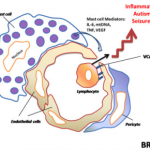Mast Cell Activation Disease
Abstract
Mast cell activation syndrome MCAS is a condition with signs and symptoms involving the skin, gastrointestinal, cardiovascular, respiratory, and neurologic systems. It can be classified into primary, secondary, and idiopathic. Earlier proposed criteria for the diagnosis of MCAS included episodic symptoms consistent with mast cell mediator release affecting two or more organ systems with urticaria, angioedema, flushing, nausea, vomiting, diarrhea, abdominal cramping, hypotensive syncope or near syncope, tachycardia, wheezing, conjunctival injection, pruritus, and nasal stuffiness. Other criteria included a decrease in the frequency, severity, or resolution of symptoms with anti-mediator therapy including H 1 and H 2 histamine receptor antagonists, anti-leukotrienes, or mast cell stabilizers. Laboratory data that support the diagnosis include an increase of a validated urinary or serum marker of mast cell activation MCA, namely the documentation of an increase of the marker above the patient s baseline value during symptomatic periods on more than two occasions, or baseline serum tryptase levels that are persistently above 15 ng/ml, or documentation of an increase of the tryptase level above baseline value on one occasion. Less specific assays are 24-h urine histamine metabolites, PGD 2 Prostaglandin D 2 or its metabolite, 11-β-prostaglandin F 2 alpha. A recent global definition, criteria, and classification include typical clinical symptoms, a substantial transient increase in serum total tryptase level or an increase in other mast cell derived mediators, such as histamine or PGD2 or their urinary metabolites, and a response of clinical symptoms to agents that attenuate the production or activities of mast cell mediators.
Mast Cell Activation Disorder MCAD, Chronic Illness, and its Role in Methylation. What do chronic illnesses such as Autism, Chronic Fatigue Syndrome CFS.

Mastocytosis, one of the mast cell diseases, is a rare mast cell activation disorder of both children and adults caused by the presence of too many mast cells.

Mast cell activation disease comprises disorders characterized by accumulation of genetically altered mast cells and/or abnormal release of these cells mediators.
Mast cell activation disorders are a spectrum of immune disorders that are unrelated to pathogenic infection and involve similar symptoms that Allergic disease.

REVIEW Open Access Mast cell activation disease: a concise practical guide for diagnostic workup and therapeutic options Gerhard J Molderings1, Stefan.
What do chronic illnesses such as Autism, Chronic Fatigue Syndrome CFS, Fibromyalgia Lupus, Chronic Lyme Disease, Interstitial Cystitis, Multiple Sclerosis, and more have in common. Well, these illnesses may have a lot of things in common, and a lot of overlapping symptoms, but many patients symptoms seem to be compatibled with Systemic Mast Cell Activation Disorder MCAD.
So what is MCAD according to Mayo Clinic.
Systemic mastocytosis mas-to-sy-TOE-sis is a disorder caused by a genetic mutation that results in an excessive number of mast cells in your body. Mast cells normally help protect you from disease and aid in wound healing by releasing substances such as histamine and leukotrienes. But if you have systemic mastocytosis, excess mast cells can build up in your skin, around blood vessels, in your respiratory, gastrointestinal and urinary tracts, or in reproductive organs. When triggered, these mast cells release substances that can overwhelm your body and result in symptoms such as facial flushing, itching, a rapid heartbeat, abdominal cramps, lightheadedness or even loss of consciousness. Common triggers include alcohol, temperature changes, spicy foods and certain medications.
A Slightly Better List of Triggers
The following triggers may influence a mast cell response: drug abuse, excessive alcoho consumption, preservatives, stress, sunlight, environmental toxins, bacteria/fungi/mold, artificial colors or flavorings, heat/cold, etc. Minimizing your exposure to these triggers may help redcuce you mastocytosis risk.
I know for a fact that many have trouble with one, many, or perhaps all of these triggers. From that list, I know alcohol, stress, sunlight, bacteria, mold, heat, and cold trigger my symptoms. The only thing I haven t noticed as a trigger are artificial colors or flavoring, but maybe I am not paying close attention. Spicy food, which is not on this list can be another trigger for MCAD.
Mayo Clinic had a decent list at symptoms associated with Systemic Mastocytosis, but let s look a little more in-depth of symptoms, since Systemic Mastocytosis has many of them.
The U.K. NHS has a pretty good list. The symptoms are a bit scattered throughout the article, so I ll modify it a bit to make one complete list.
A Relatively Complete List of Associated Symptoms
hot flushing – described as a dry feeling of heat, rather than the sort of wet heat you experience when sweatingpalpitations irregular heartbeat lightheadednessheadacheshortness of breathchest painnauseadiarrhoeastomach pain caused by peptic ulcersloss of appetiteweight lossswelling of the liver, which can cause jaundice yellowing of the skin and eyes and make you feel lethargicswelling of the spleen, which can cause abdominal tummy and shoulder painjoint painswelling of the lymph nodesweaknessfatiguechanges in mental state, such as confusion, irritability, poor attention span and impaired memoryurinary symptoms needing to pass urine frequently, or pain when passing urine Low Blood Pressure Hypotension dizzinessfainting a sudden, temporary loss of consciousness blurred visiongeneral weakness
If you reach the state of anaphylaxis, you can even also have symptoms such as:breathing difficultiesdizzinessswollen eyes, lips, genitals, hands, feet and other areas called angio-oedema itchy skin or nettle rash hives a strange metallic taste in the mouthsore, red, itchy eyeschanges in heart ratea sudden feeling of extreme anxietyunconsciousness due to very low blood pressureabdominal cramps, vomiting or diarrhoeafever
While the NHS doesn t mention hypertension, some patients may present with hypertension. Hyperadrenergic POTS can present in Mast Cell Activation Disorders. Hyperadrenergic POTS presents with orthostatic intolerance associated with an elevated heart rate 30 bpm within 5 minutes of standing and hypertension 20 mm Hg increase in systolic blood pressure upon standing.
See Hyperadrenergic Postural Tachycardia Syndrome in Mast Cell Activation Disorders in the journal Hypertension.
Is There Research Connecting MCAD to Chronic Illness.
Ok, by now, you may be thinking, wow, I have many of the triggers and symptoms on this list, but is there research showing that this condition exists in various chronic illnesses. The answer to that question is yes. While there may not be a whole lot of research, Dr. Theoharides, the Director of the Molecular Immunopharmacology Drug Discovery Laboratory, has put out quite a lot of research.
You can check out his huge amount of research here:
Treating Mast Cell Activation
While a lot of Dr. Theoharide s research focuses on natural substances such as Luteolin for inhibiting mast-cell activation, and while he is the medical director of Algonot, it s important to note that he receives no compensation from this company. I think it is important to note this fact because often when one has financial ties to companies or products, their research often becomes skewed or misleading. Algonot develops a supplement for MCAD called Neuroprotek that contains the bioflavonoids Luteolin, Quercetin, and Rutin.
There are pharmaceuticals for MCAD. Hydroxyzine preparations can be quite powerful, but usually require a prescription. Anecdotally, the combination of Zantac and Zyrtec OTC at your local pharmacy seems to work pretty well. Zyrtec is an H1 receptor inverse agonist and Zantac is a H2-receptor antagonist. However, even though these are over the counter, do not begin these medications without consulting with a qualified healthcare practitioner first.
Is MCAD connected to methylation.
This may be the million dollar question. There is not much information and MCAD and methylation, but I will end with a quote from the theory at mthfrheds.com.
MTHFR Polymorphism may be a predisposing factor to mast cell disease. 5-MTHF regulates biosynthesis of BH4. The A1298 mutation in the MTHFR enzyme effects the conversion of BH2 to BH4. Less amounts of BH4 inhibits NO formation resulting in increased mast cell degranulation. Inadequate BH4 formation also puts a strain on the conversion of tryptophan to serotonin and tyrosine to dopamine, leading to low levels of the neurotransmitters: dopamine, norepinephrine, serotonin and melatonin.
Low blood serotonin levels help define a sub-group of patients with mastocytosis that are more likely to present with neurological and gastrointestinal complaints. Human mast cells can express and be activated through multiple serotonin receptors, and synthesize and release serotonin. Low blood serotonin levels in such patients may be the result of low BH4 levels due to 5-MTHF deficiency, the result of long-term malabsorption from chronic inflammation of the gastrointestinal tract or both, as is the case with me.
BH4 is a critical factor in cellular activities such as cell proliferation, cell cycle regulation and differentiation. Could BH4 deficiency secondary to MTHFR polymorphism be one of the fundamental mechanisms that underlie mast cell proliferation.
So the question I am left with is what substances should we try, or how do we modify our methylation protocol when it seems that MCAD may play a large role in the clinical picture. In the absence of improvement of MCAD type symptoms without taking antihistamines or Luteolin-based supplements, would taking BH4 directly help. Is BH4 deficiency really the issue.
If anyone has any comments on how to address MCAD with methylation supplements, or if they have tried taking BH4 directly, please comment.

Systemic mastocytosis mas-to-sy-TOE-sis is a caused by a genetic mutation that results in an excessive number of mast cells in your body.